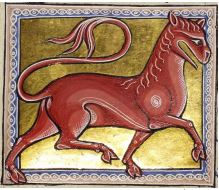The theological and doxological reference to the Resurrection and the Pentecost according to the orations of Gregory of Nazianzus XLI and XLV
Article Sidebar

Main Article Content
In the forty-one oration, Gregory of Nazianzus analyzes the divinity of the Holy Spirit, a subject that is developed again with more severe way in his Fifth Theological Oration. Gregory tries to establish the point by quite a different set of arguments from those adopted in the former discourse, none of whose points are here repeated. In the other oration, forty-five, Gregory refers to the importance of the resurrection for the human race. He presents Christ as the new Adam who saved the human from the death and reunites again the man with God. This is a subject that is referred to the oration forty-one, too. In this paper, we will examine the teaching of Gregory of Nazianzus about the divine status of the Holy Spirit and his equality to the other two persons of the Triune God through theological and biblical images. Also, we
will present how he connects his teaching for anthropology based on the Christology. In the end we will show how Gregory produced these orations for public festivals within the literarily ripe tradition of pagan festival rhetoric, but he gives to his orations theological content.
Article Details
ARTEMI, EIRINI, ‘The triadological teaching of Gregory Nazianzen about God in his twentieth
Oration On Theology and the office of Bishops’, 25.3.2014. IDEM, ‘Gregory Nazianzen’s trinitarian teaching based on his Twentieth Theological Oration’, De Medio Aevo 4.2 (2013), pp. 127-146.
ARTEMI, EIRINI, ‘Τhe knowledge of the Triune God according to Isidore of Pelusium’, Vox
Patrum 34 (2014), t. 61, pp. 327-342
BEELEY, CHRISTOPHER, Α., ‘The Holy Spirit in the Cappadocians: Past and Present’, Modern
Theology 26:1 (2010), pp. 90-119
BEELEY, CHRISTOPHER, A., ‘The Early Christological Controversy: Apollinarius, Diodore, and
Gregory Nazianzen’, Vigiliae Christianae, 65.4 (2011), pp. 376-407.
BEELEY, CHRISTOPHER, Gregory of Nazianzus on the Trinity and the knowledge of God. In Your Light We Shall See Light, Oxford Studies in Historical Theology, (Oxford, 2013).
BROWNE, CH. G., SWALLOW, J. ED., From Nicene and Post-Nicene Fathers, Second Series, Vol. 7, ed. by PH. SCHAFF, H. WACE, (Buffalo - New York, 1894).
BUCHINGER, H., Pascha bei Origines: Systematische Aspekte (Innsbruck, 2005).
DRAGAS, GEORGE, ‘Orthodox Ecclesiology in Outline’
FILIAS, GEORGE, Tradition and Development in the Worship of the Church, (Athens, 2014).
FILIAS, GEORGE, Studies of History and Theology of Orthodox Worship, (Athens, 2002).
FOUNTOULIS, JOHN, Issues about Liturgy, (Thessaloniki, 1977).
FYLAKTOS, CONSTANTINOS – DAMASKINOS, Historical and Theological Aspect of Anaphora
(Eucharistic Prayer) of the Divine Liturgy of St. Gregory the Theologian, (Athens, 2016).
GALLAY, PAUL, La vie de Saint Grégoire de Nazianze, (Lyon – Paris, 1943)
GIULEA, DRAGOS ANDREI, ‘The Cappadocian Paschal Christology: Gregory Nazianzen and Gregory of Nyssa on the Divine Paschal Image of Christ’, ZAC 12 (2009), pp 477-503, esp. p. 478, ref. 3, Doi 10.1515/ZAC.2008.029.
HOFER, ANDREW, O.P, Christ in the Life and Teaching of Gregory of Nazianzus, (Oxford, 2013).
‘In the name of the Father and of the Son and of the holy Spirit’, CATECHISM OF THE CATHOLIC
CHURCH.
LOUDOVIKOS, NIKOLAOS, “person instead of grace and dictatedotherness: John Zizioulas’
finaltheological position”, The Heythrop journal XLVIII (2009), pp. 1–16, esp. p. 8, DOI:
10.1111/j.1468-2265.2009.00547.x
LOSSKY, VLADIMIR, The Mystical Theology of the Eastern Church, (New York, 2002).
MATZ, BRIAN, Gregory of Nazianzus, series: Foundations of Theological Exegesis and Christian
Spirituality, (Grand Rapids, 2016).
NACHEF, ANTOINE, Mary: Virgin mother in the thought of the Cappadocian Fathers, Doctoral
Dissertation, International Marian Research Institute University of Dayton, (Ohio, 1997).
NOBLE, THOMAS A., ‘Gregory Nazianzen's use of Scripture in defence of the deity of the Spirit’, Tyndale Bulletin 39 (1988), pp. 101-123.
NOBLE, THOMAS A., The Deity of the Holy Spirit according to Gregory of Nazianzus, (Edinburgh, 1989).
OPPERWALL, DAVID G., The Holy Spirit in the life and writings of Gregory of Nazianzus, (McMaster University, 2012).
PAPADOPOULOS, STYLIANOS, Patrologia, 2, (Athens, 1990)
PAPADOPOULOS, STYLIANOS, Gregory Theologian and the presuppositions of his pneumatological
teaching, (in greek), (Athens, 1989).
Most read articles by the same author(s)
- Eirini Artemi, The Virgin Mary, Theotokos, and Christ, true God and true man. The mystery of Incarnation according to Cyril of Alexandria , Mirabilia: electronic journal of antiquity and middle ages: No. 17 (2013): July-December: Mulier aut Femina. Idealism or reality of women in the Middle Ages
- Eirini Artemi, Man’s "knowledge" and "ignorance" for God in the teaching of Gregory of Nyssa and Nicholas of Cusa , Mirabilia: electronic journal of antiquity and middle ages: No. 19 (2014): Nicholas of Cusa (1401-1464) in Dialogue
- Eirini Artemi, Clement of Alexandria (c. 150-215) and the use of musical metaphors and musical myths in his texts , Mirabilia: electronic journal of antiquity and middle ages: No. 28: The Medieval Aesthetics: Image and Philosophy
- Eirini Artemi, The pneumatology of Great Basilius in his treatise to Amphilochius Iconium , Mirabilia: electronic journal of antiquity and middle ages: No. 25 (2017): Idea and image of royal power of the monarchies in Ancient and Medieval World
- Eirini Artemi, The knowledge of the Medicine in the writings of Basil of Caesarea , Mirabilia: electronic journal of antiquity and middle ages: No. 32 (2021)
- Eirini Artemi, The role of Ephesus in the late antiquity from the period of Diocletian to 449AD the Robber Synod , Mirabilia: electronic journal of antiquity and middle ages: No. 26 (2018): Society and culture in Portugal
- Eirini Artemi, Moses and the gnosiology of God, according Gregory’s of Nyssa interpretation in Canticum Canticorum , Mirabilia: electronic journal of antiquity and middle ages: No. 20 (2015): Art, Criticism and Mysticism
- Eirini Artemi, John of Damascus and the use of the letters of Paul in his writing An Exact Exposition of the Orthodox Faith , Mirabilia: electronic journal of antiquity and middle ages: No. 24 (2017): Manifestations of the Ancient and Medieval World